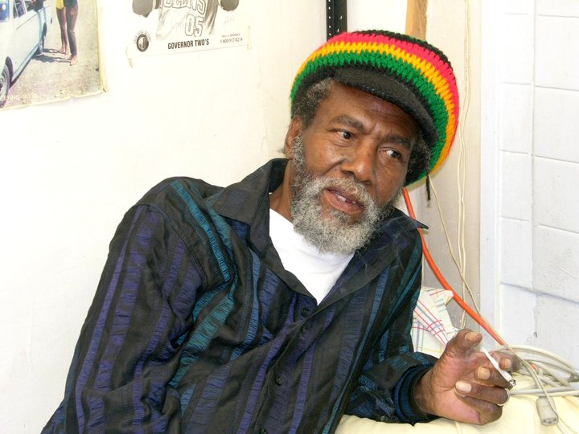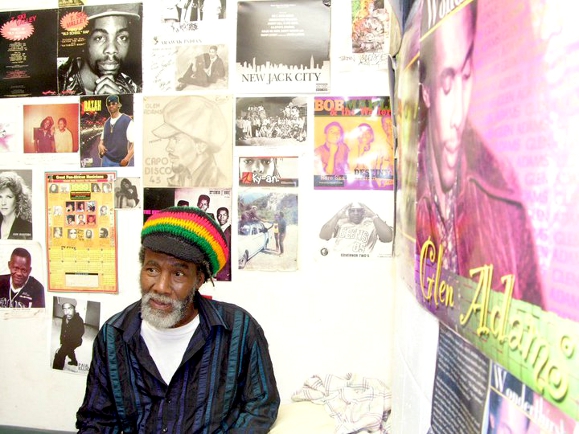Articles about reggae music, reviews, interviews, reports and more...
Tribute to Glen Adams

Tribute to Glen Adams
Glenroy "Capo" Adams passed away on December 17 at the age of 65 in Jamaica.
Sampler

It's been a sad year for reggae veterans. Fans have mourned the passing of Vivian Jackson, Lynn Taitt, Sugar Minott, Sonia Pottinger and Gregory Isaacs in 2010 and as the year ends, we have to add another name to the list.
Glenroy "Capo" Adams passed away on December 17 at the age of 65 in Jamaica. Glen suffered a stroke earlier in the year and although he was on the road to recovery, his condition worsened at the end of the year and he died after spending a couple weeks in the hospital, surrounded by family and friends.
Glen was best known for his time behind the keyboards in the Hippy Boys and later the Upsetters, but his musical career went much deeper than many people realize. He was born in 1945, and like so many Jamaican youth, music became Glen's greatest passion. While he was a teenager, Glen sang in a vocal group and a solo performance on Vere Johns’ Opportunity Hour in 1961 caught the attention of Clement "Coxson" Dodd, who arranged for Glen's first record "Wonder Thirst" (AKA "Look Before You Leap"). The single didn't go anywhere, and it was a few years before Glen found success again, teaming up with Ken Boothe as Glen and Ken, coming in second place in the 1966 Festival Song Competition with "I Remember".
While he earned a living as a tailor, Glen moved on to work with Duke Reid at Treasure Isle as an informal musical director and talent scout, introducing singers to the Duke for recording. In 1967 Glen walked out on Reid and returned to the recording studio as a solo artist once more, cutting a series of rocksteady singles for Bunny Lee. He also sang in an early Pioneers line up, recording a few songs with the group including "Shake It Up".
A definitive moment for Glen came at a session for Lee in 1968. He was asked to play organ when the regular keyboard player didn't show up for a session. While his style was rudimentary, his keyboard work added a certain vibe to the recordings, which included "Bangarang" by Stranger Cole and "Everybody Needs Love" by Slim Smith. Encouraged by this unexpected acclaim for his work, he further honed his keyboard skills and before long Glen was a regular session musician.
Glen's next musical project was one of the bands that he is best known for. He formed the Hippy Boys with guitarist Alva "Reggie" Lewis, bassist Aston "Family Man" Barrett and his brother Carlton Barrett on drums. The group cut a series of wild and groovy instrumentals including "Death Rides A Horse" and "Psychedelic Reggae" as well as backing Max Romeo on his rude hit "Wet Dream". The band also recorded as the Reggae Boys and the Soul Mates, with Adams and Lewis performing vocals on early reggae favourites such as "Them A Laugh And Ki Ki" and "What Is This" (AKA "Ba Ba"). The Hippy Boys performed on sessions for a variety of producers, including Bunny Lee, Joe Gibbs and Sonia Pottinger, who produced their only LP, Reggae With The Hippy Boys, in 1969.
Fate stepped in when in November 1969 the Upsetters famous "Return Of Django" became a top 10 hit in England and the band was invited to travel overseas and tour the country. The original Upsetters were unable to commit to the tour and so Lee "Scratch" Perry approached the Hippy Boys to take their place. And so it was that the Hippy Boys became the new Upsetters.
The band toured England to great acclaim and performed on Top Of The Pops. Upon their return to Jamaica, the Upsetters were rather frustrated with Perry, who apparently had taken the lion's share of the money from the tour. At this time, Bob Marley had been following the Upsetters with great interest. After some years of struggling, The Wailers were looking to jump start their sound and were amazed that The Upsetters had been so popular overseas. Before long, Bob Marley realized that a collaboration between them and The Wailers could be an unstoppable combo. After a few rehearsals and jam sessions together, Marley talked The Upsetters into abandoning Perry and joining the Wailers.
The sessions that Glen Adams and friends recorded with the Wailers and Lee Perry proved to be a high point not only in their careers but in the history of reggae. The chemistry between Perry and Marley, the Wailers and the Upsetters proved to be phenomenal. Together, they produced classic songs like "Small Axe", "Duppy Conqueror", "400 Years", and many others that changed the course of reggae and laid the foundation for Bob Marley's subsequent success. Some of the songs were re-recorded later on in Marley's career, but the magic of the Perry sessions has never been surpassed. One of the most famous Perry productions from these sessions was the mesmerizing "Mr. Brown". The song - a spooky story of a man who dies and is reincarnated as a crow who perches on his own coffin on the way to the funeral - was written by Glen Adams who also provided the unforgettable organ work on the song.

In addition to working with Lee Perry and the Wailers at this time, Glen also played keyboards for producer Herman Chin Loy and was the original "Augustus Pablo". The name was invented by Chin Loy who wanted a more exotic sounding moniker for his performers in order to create a sense of mystery. After Glen recorded a few songs as Pablo, Chin Loy then gave the name to the young melodica player Horace Swaby, who permanently adopted the name and become famous as Augustus Pablo.
In 1972, the Upsetters split when the Barrett brothers became a permanent part of the Wailers band. Perry kept the name Upsetters to refer to the floating band of musicians that played for him over the years. Glen remained with Perry for a short time and a few years later left Jamaica for the United States, settling in Brooklyn in 1975. From there, he started his own record label, Capo, and for the remainder of the decade cut some very funky reggae and disco tunes as the Glen Adams Affair, including the dancefloor favourite "Just A Groove" and the early hip hop number "Chicken Scratch" with DJ Freeze.
For the next 20 years, Glen stayed active, working on a wide variety of projects and recordings. He played piano and keyboards for New York-based Reggae producers Brad Osbourne and Lloyd "Bullwackie" Barnes, started another band named The Realistics, and played synthesizers for Coxson Dodd when he too relocated his Studio One operations to New York. More recently Glen worked with old friends Susan Cadogan and Keith Rowe as well as popular dancehall singer Shaggy. Although he had mostly been sitting in the producer's chair and in the studio for many years, Glen finally returned to live performances, touring the USA and Europe in 2002 with ska revivalists The Slackers and played occasional shows with the Jammyland All Stars.
Glen suffered a stroke in early 2010 and remained in poor health for the rest of the year. While visiting Jamaica with his wife Judy, his condition suddenly deteriorated and he was admitted to hospital. Although his family remained hopeful of a recovery, Glen passed away on December 17.
A YouTube search for "Glen Adams" reveals many obscure records and live performances, a lifetime of music that will no doubt be rediscovered now that Glen is gone. On his Facebook page, Glen's description of himself was simply "I don't like to big myself up. I am humble in the way Jah want I to be." With such a rich musical legacy behind him, Glen's modesty is just as impressive as his career.
Read comments (1)
| Posted by Susan Cadogan on 02.05.2011 | |
| Someone sent me this link and I am so happy to read about Glen Adams, It seemed since his untimely passing, he had been forgotten and so I am glad to see this. . Glen always wanted to return to Jamaica to live and this he did. He was always not in "A-1" health but was doing well until he became ill on November 25th....I know this because I was there, through the weeks of his illness. I honor his name and his legacy and am happy to have been his friend for 37 years. Rest in Peace! | |
Comments actually desactivated due to too much spams
Browse by categories
Recommended Articles
Latest articles
Recently addedView all
© 2007-2026 United Reggae. All Rights Reserved. Reproduction in whole or in part is prohibited. Read about copyright
Terms of use | About us | Contact us | Authors | Newsletter | A-Z














